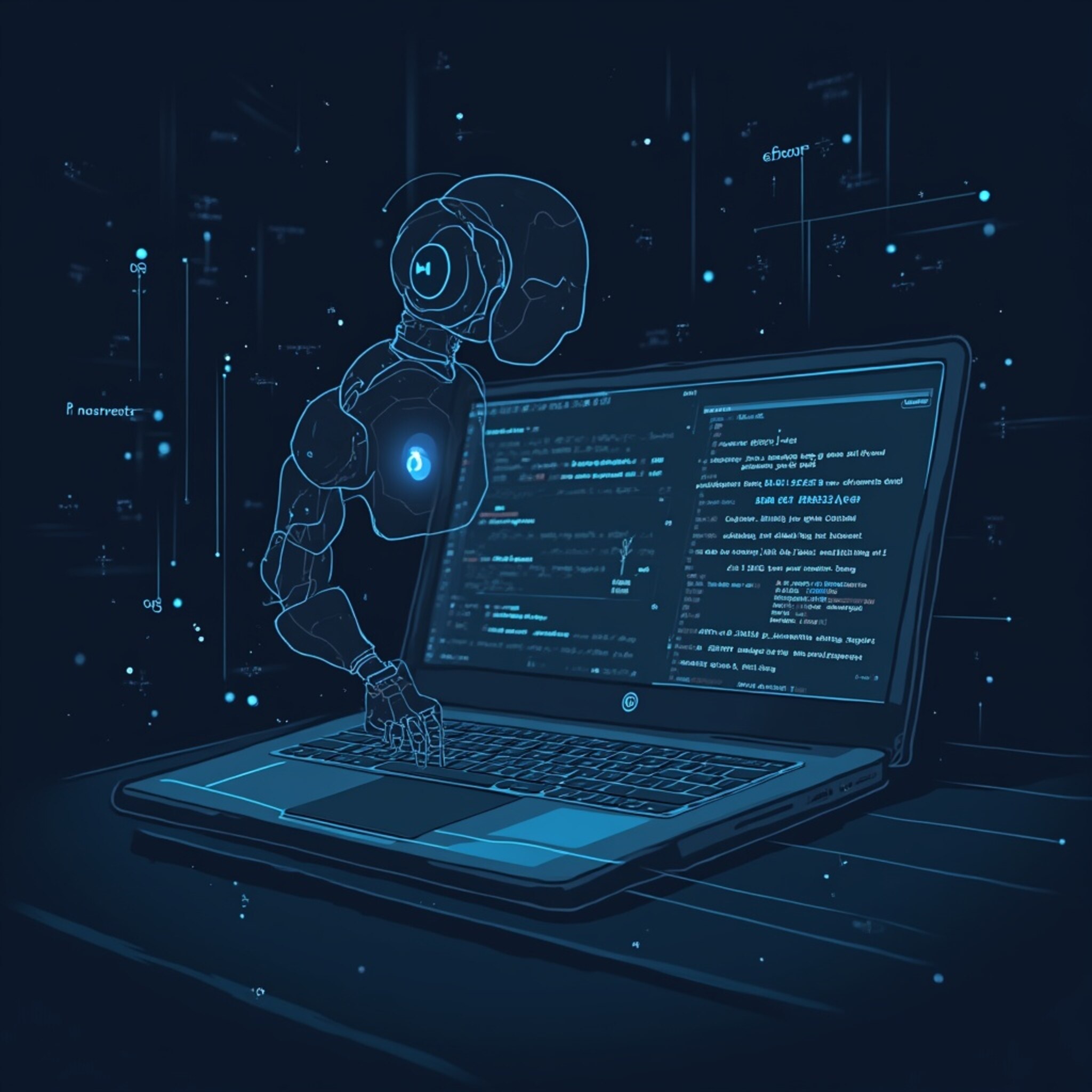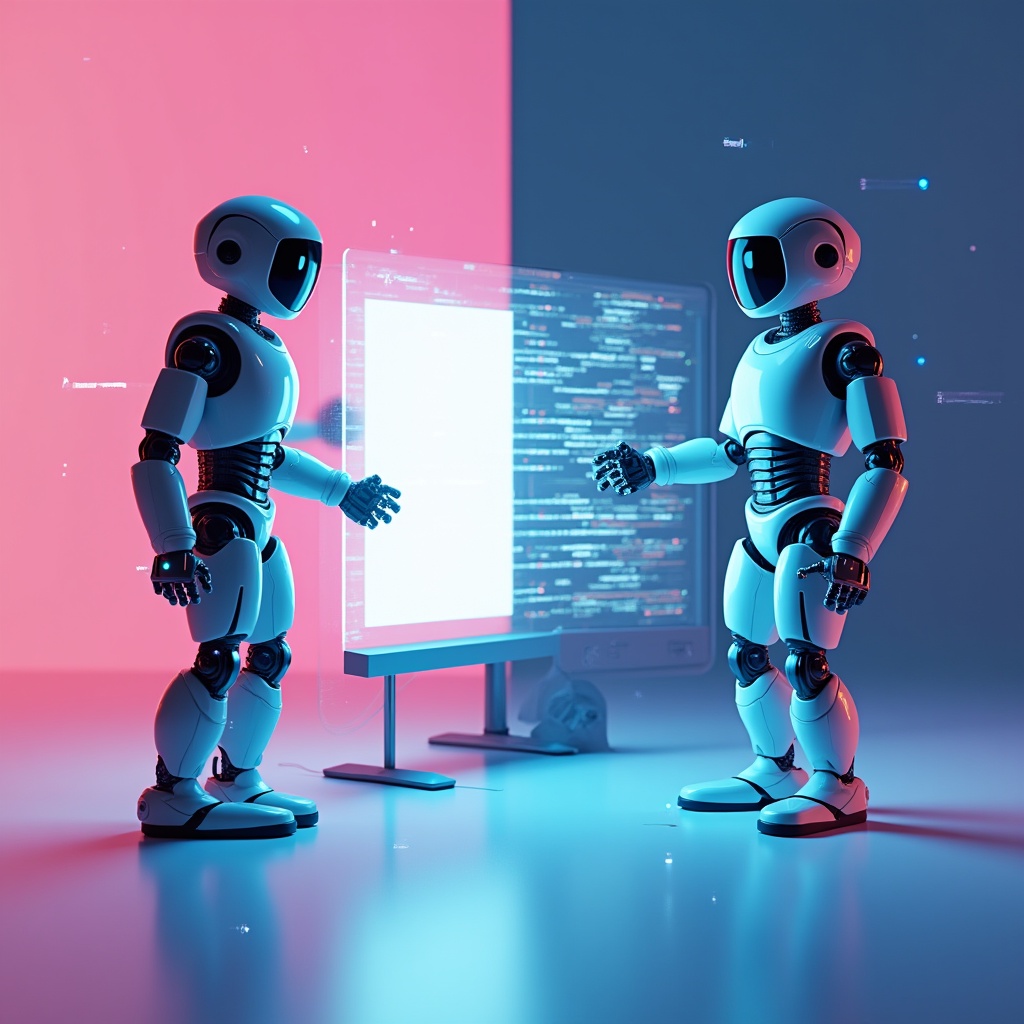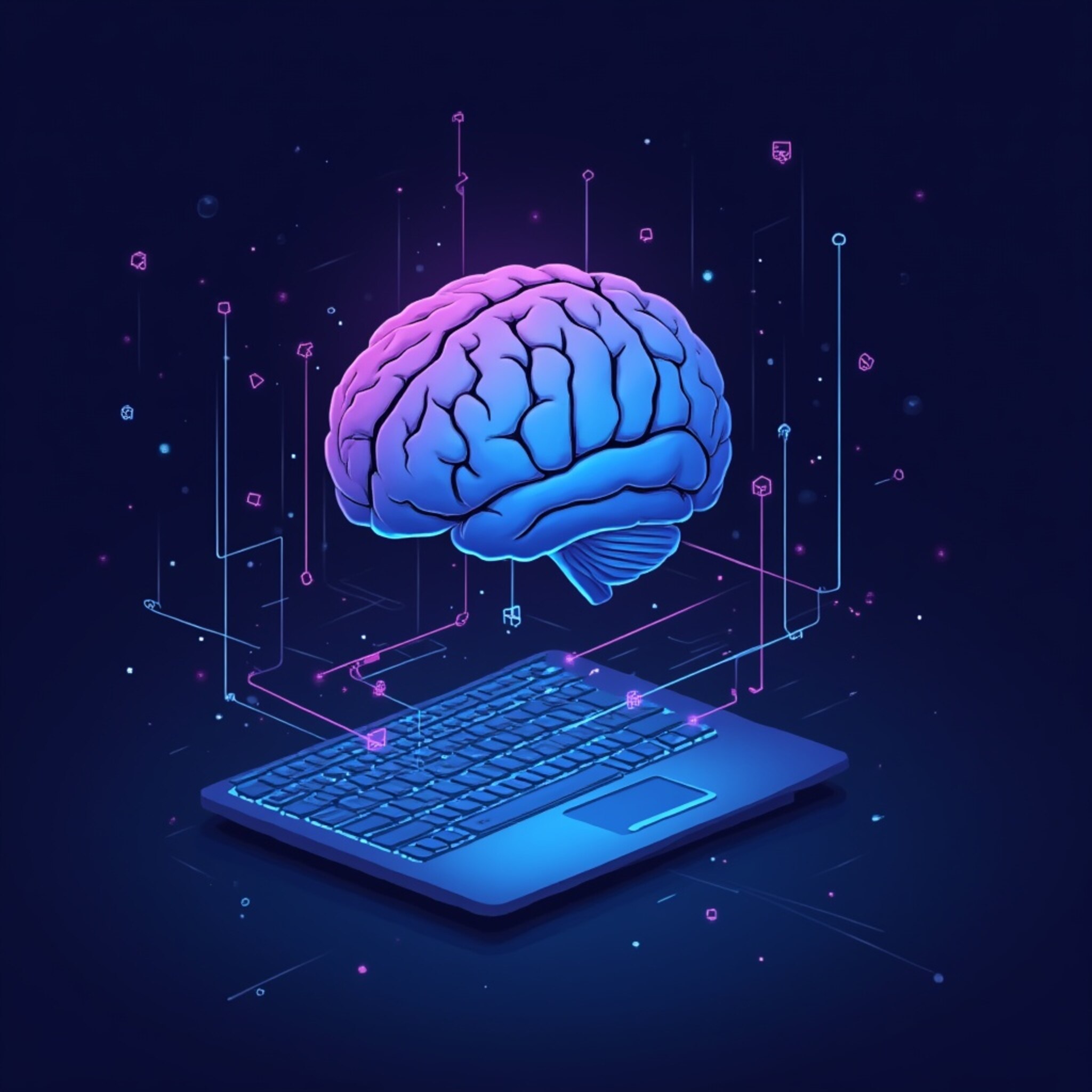AI code generators are specialized tools that automatically create code snippets based on your inputs, saving developers countless hours on repetitive tasks while maintaining quality. They excel at producing boilerplate code, generating test cases, and translating between programming languages with minimal human oversight.
The Coding Revolution That’s Changing How We Build Software
Remember when writing code meant staring at a blank screen, trying to remember the exact syntax for that one function you’ve written a hundred times before? Yeah, those were the dark ages. I spent countless hours of my life typing out the same authentication logic, form validation, and database connections until my fingers developed their own muscle memory for semicolons.
But here’s the thing—we’re living in a different world now. AI code generators have quietly slipped into our development workflows and are changing the game in ways that would’ve seemed like science fiction just a few years ago. They’re essentially like having a super-smart junior developer who never sleeps, doesn’t need coffee breaks, and won’t get offended when you completely rewrite their work.
The catch? They’re not perfect (neither am I, tbh), and they’re definitely not here to replace human developers. But they ARE transforming how we approach programming tasks, especially teh repetitive ones that nobody really enjoys anyway.
Let’s break it down…
What Is an AI Code Generator?
An AI code generator is a specialized tool powered by machine learning algorithms that can automatically create code snippets or even entire functions based on natural language descriptions, comments, or examples. Think of it as your coding assistant that can translate your intentions into actual, runnable code.
These tools range from simple autocompletion helpers to sophisticated systems that can:
- Generate functions from descriptions (“Create a function that sorts an array of objects by their date property”)
- Convert code between different programming languages
- Suggest optimizations for existing code
- Create unit tests automatically
- Debug and explain problematic code sections
The most advanced versions like GitHub Copilot, Amazon CodeWhisperer, and tools built on GPT models can even understand context from your entire project and generate contextually appropriate solutions.
From Simple Snippets to Complex Functions
Modern AI code generators have evolved far beyond basic templating. They now demonstrate an impressive ability to understand programming concepts, follow best practices, and even adapt to your personal coding style over time.
What makes them particularly powerful is their training on vast repositories of open-source code, allowing them to learn patterns and solutions from millions of real-world examples. This means they’re not just regurgitating snippets—they’re synthesizing new code based on how human programmers solve similar problems.
Learn more in
AI Writing Generator: Create Polished Content Effortlessly
.
Why AI Code Generators Matter
So why is everyone from solo developers to massive tech companies suddenly obsessed with these tools? The benefits are substantial and touch nearly every aspect of the development process.
Supercharging Developer Productivity
The most obvious benefit is sheer productivity. Research suggests that developers using AI assistants can complete tasks up to 55% faster than those coding manually. This isn’t just about typing speed—it’s about eliminating the mental overhead of:
- Remembering exact syntax and function signatures
- Writing boilerplate code that follows the same patterns
- Implementing standard algorithms from scratch
- Manually translating between programming languages
When I first started using these tools, I was skeptical. But after watching an AI generate in seconds what would’ve taken me 15 minutes of Stack Overflow searching and typing, I was convinced. It’s like having all your past coding experience and knowledge instantly accessible.
Reducing Errors and Improving Quality
Human developers make mistakes. We forget to handle edge cases, we introduce subtle bugs, and sometimes our attention wanders after the sixth hour of coding. AI code generators, however, are remarkably consistent.
They’re trained on vast codebases that include proper error handling, security practices, and performance optimizations. This means they often generate code that’s more robust than what a tired human might write at 2 AM before a deadline.
That said, they’re not infallible. Their output still requires human review (more on that later), but they do catch many common mistakes before they even make it into your codebase.
Lowering the Barrier to Entry
One of the most interesting impacts of AI code generators is how they’re changing who can build software. By handling technical implementation details, these tools allow people with domain knowledge but limited coding experience to create functional applications.
A marketing specialist who understands exactly what they need but doesn’t know Python can now describe their requirements and get working code. This democratization of development is gonna change the software landscape dramatically in the coming years.
How AI Code Generators Work (Without the Complex Math)
Behind the wizardry of AI code generation lies some fascinating technology that’s worth understanding—even if you’re not planning to build your own AI system anytime soon.
The Training Process
Most AI code generators are built using large language models (LLMs) that have been trained on massive datasets of code from public repositories like GitHub. During training, these models learn to predict what code should come next given what came before.
This process involves:
- Pattern recognition: Identifying common coding patterns across millions of examples
- Context understanding: Learning how different parts of code relate to each other
- Style adaptation: Recognizing different programming styles and conventions
The result is a model that can generate statistically likely code completions based on the context you provide.
From Prompt to Code
When you interact with an AI code generator, the process typically looks like this:
- You provide a prompt (comment, partial code, or natural language description)
- The AI processes this input against its trained knowledge
- It generates multiple possible completions
- These completions are ranked based on relevance and quality
- The best option is presented to you (though some tools show alternatives)
The more context you provide, the better the results. A vague prompt like “create a login system” will yield generic results, while “create a JWT-based authentication system for a Node.js API with MongoDB user storage” gives the AI much more to work with.
Common Myths About AI Code Generators
Let’s address some of the misconceptions floating around about these tools, because there’s plenty of both hype and fear that don’t match reality.
Myth 1: “They’ll Replace Human Programmers”
This is probably the biggest fear, and it’s understandable. But the reality is much more nuanced. AI code generators are incredibly powerful assistants, not replacements. They excel at implementation but struggle with high-level design, understanding business requirements, and making architectural decisions.
What we’re seeing in practice is that these tools are changing what human programmers focus on—shifting attention from syntax and implementation details to system architecture, user experience, and business logic. The human role is evolving, not disappearing.
Myth 2: “The Code They Generate Is Always Reliable”
While AI code generators produce impressive results, their output isn’t guaranteed to be correct, secure, or optimal. They can:
- Generate code that looks good but contains logical errors
- Introduce subtle security vulnerabilities
- Create inefficient implementations of algorithms
- Hallucinate functions or libraries that don’t actually exist
This is why human review remains essential. The best practice is to treat AI-generated code the same way you’d treat code from a junior developer—review it carefully before trusting it.
Myth 3: “You Don’t Need to Know How to Code”
While AI code generators can help non-programmers create simple applications, truly effective use of these tools still requires programming knowledge. Understanding what makes good code, being able to spot potential issues, and knowing how to adapt the generated code are all critical skills.
In fact, experienced developers often get better results from these tools because they know how to prompt them effectively and can quickly evaluate the quality of what’s generated.
Real-World Examples: AI Code Generators in Action
Let’s look at some practical examples of how developers are using these tools in their daily workflows.
Rapid Prototyping
One of the most popular uses is quickly building proof-of-concepts and prototypes. Instead of spending days setting up basic functionality, developers can describe what they need and have working code in minutes.
For example, a startup I worked with needed to demonstrate a concept to investors but didn’t have time for a full development cycle. Their team used AI code generation to create a functional prototype in two days instead of two weeks, helping them secure their next round of funding.
Learning New Technologies
AI code generators can be excellent learning tools. When approaching a new framework or language, you can ask the AI to generate example code that demonstrates specific patterns or techniques.
A junior developer on my team was struggling with React hooks. Instead of just reading documentation, they asked an AI assistant to generate examples of different hook patterns with explanations. This interactive approach helped them grasp the concepts much faster than traditional learning methods.
Refactoring Legacy Code
Modernizing old codebases is another area where these tools shine. You can ask them to translate COBOL to Python, convert callback-based code to use async/await, or update deprecated API calls to current versions.
One company I consulted for had a 15-year-old Java backend that needed updating. Using AI assistance, they were able to modernize critical portions while maintaining the same functionality, saving months of tedious manual work.
Documentation Generation
Writing clear documentation is crucial but often neglected. AI code generators can help by automatically creating documentation for your functions, classes, and APIs based on the code itself.
This includes generating:
- Function and parameter descriptions
- Usage examples
- API endpoint documentation
- README files
Learn more in
AI Writing Generator: Create Polished Content Effortlessly
.
The Limitations You Should Be Aware Of
While I’ve highlighted many benefits, it’s important to understand where these tools fall short to use them effectively and safely.
Security Concerns
AI code generators can inadvertently introduce security vulnerabilities if they don’t fully understand the security context of what they’re generating. Common issues include:
- SQL injection vulnerabilities in database code
- Improper input validation
- Insecure default configurations
- Hard-coded credentials or sensitive information
Always review generated code with security in mind, especially for authentication, data handling, and external API interactions.
Domain-Specific Knowledge Gaps
While these tools have broad knowledge of programming patterns, they may lack understanding of your specific business domain or proprietary systems. They can’t know about your internal services, custom libraries, or business rules unless you explicitly inform them.
This means they’re better at generic programming tasks than at generating code that integrates deeply with your existing systems or implements complex business logic.
Reliability and Consistency Issues
The output quality from AI code generators can vary significantly based on:
- How well you phrase your prompt
- The specific task you’re trying to accomplish
- The tool’s familiarity with relevant code patterns
Sometimes the same prompt will yield excellent code, while other times it produces something that barely works or contains subtle bugs. This inconsistency means you need to maintain vigilance rather than blindly trusting the output.
What’s Next for AI Code Generation?
As we look toward the future, several exciting developments are emerging in this space:
More Specialized Tools
We’re starting to see AI code generators tailored to specific domains and frameworks. Instead of general-purpose tools, expect to see assistants specialized in areas like:
- Mobile app development
- Game programming
- Data science and ML pipelines
- IoT and embedded systems
These specialized tools will have deeper knowledge of their domains and produce more relevant, optimized code than general-purpose generators.
Better Integration with Development Environments
The next generation of tools will be more deeply integrated into the development workflow, with features like:
- Automatic test generation based on implementation
- Proactive security scanning of generated code
- Integration with code review systems
- Continuous learning from team feedback and code patterns
Rather than standalone tools, they’ll become an invisible part of the development process, suggesting improvements and alternatives as you work.
Ethical and Legal Frameworks
As these tools become more prevalent, expect to see more defined legal and ethical frameworks around:
- Licensing of generated code
- Attribution requirements
- Liability for bugs or security issues
- Privacy concerns around code sent to external services
Organizations and individual developers will need to establish clear policies about how and when AI-generated code can be used in their projects.
Final Thoughts: The Developer’s New Co-Pilot
AI code generators aren’t magic, and they certainly aren’t going to put developers out of jobs. What they offer is a new kind of partnership—a way to offload the mechanical aspects of coding so humans can focus on the creative and strategic elements that machines still can’t handle.
The most successful developers won’t be those who resist these tools, nor those who rely on them completely. Instead, it will be those who learn to collaborate effectively with AI assistants, using them to enhance their capabilities while maintaining their uniquely human perspective and judgment.
Used wisely, AI code generators can make development more accessible, efficient, and maybe even a bit more fun. And isn’t that what technology is supposed to do for us anyway?
Frequently Asked Questions
What is an AI code generator?
Why are AI code generators important?
How do AI code generators work?
Are AI code generators safe to use?
What’s the best way to use AI code generators?
Comments are disabled







